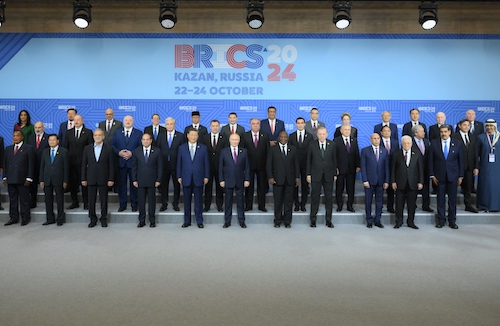The BRICS bloc of emerging economies — made up of Brazil, Russia, India, China and South Africa – has been pushing alternatives to international financial institutions like the World Bank and IMF.
Moscow – currently under international sanctions for invading Ukraine – has called for BRICS countries to introduce a common payment system and increase use of members’ national currencies for trade in a bid to free themselves from the dollar.
Russia has increasingly developed its domestic financial infrastructure, including the SPFS system for bank transfers and the Mir card payments system, after it was cut off by the West from the SWIFT global payments system over its war in Ukraine.

Chinese President Xi Jinping said: “In the current reality, there is an urgent need to reform the international financial architecture,” and BRICS “must play a leading role” in promoting a new system which better reflects profound changes to the international economic balance of power. Putin announced Iran as a “fully-fledged BRICS member”
This new set up means the US and European Union will no longer be able to use economic sanctions as a weapon against errant governments. This new settlement system allows countries to settle trades and payments in their own currencies, reducing reliance on the U.S. dollar, which has long been the dominant global currency. This undermines the value of the dollar and does not bode well for our financial future as we have eroded the dollar’s value by overprinting fiat money.
🚨🇷🇺
— Alex Barnicoat (@AlexBarnicoat_) October 24, 2024
BRICS SUMMIT
The BRICS Summit in Russia just finished
Here's a thread covering everything you need to know that happened ⬇️
(🧵 1/13) pic.twitter.com/wXkJXdghpo
Summary of the 2024 BRICS Summit
The BRICS summit, held in Kazan, Russia, from October 22 to 24, 2024, marked a significant gathering with leaders from over 30 countries in attendance, showcasing Russia’s international engagement despite ongoing tensions with the West over Ukraine. Here are the key highlights:
- Leadership and Attendance: Russian President Vladimir Putin, alongside leaders like Xi Jinping of China and Narendra Modi of India, used the summit to underscore the BRICS bloc’s growing influence. Notably, this summit was the largest event Russia has hosted in years.
- Expansion of BRICS: Discussions included the expansion of BRICS, with countries like Iran, Egypt, Ethiopia, the United Arab Emirates, and Saudi Arabia either joining or expressing interest in joining, aiming to broaden the bloc’s economic and political reach.
- Global Financial Reform: A significant focus was on reforming the international financial architecture. Xi Jinping emphasized the need for BRICS to lead in creating a new financial system, reflecting a broader push against Western financial dominance.
- Ukraine and Middle East: The conflict in Ukraine was discussed, with Putin defending Russia’s actions and highlighting the need for a de-escalation, though no concrete steps towards resolution were outlined. Additionally, there was mention of heightened tensions in the Middle East, particularly between Israel and Iran.
- Economic and Financial Initiatives: BRICS nations discussed deepening financial cooperation, including alternatives to Western-dominated payment systems like SWIFT, aiming to bypass sanctions and facilitate trade among member countries.
- Political Statements: Putin criticized Western methods like sanctions and economic coercion, suggesting these contribute to global instability. The summit was also seen as a platform for Putin to demonstrate Russia’s role in a multi-polar world order.
- Symbolic Importance: For Russia, especially Putin, the summit served as a symbolic victory, showcasing international support and defiance against Western isolation efforts, particularly highlighted by the “BRICS Plus” session involving potential new members.
This summit not only highlighted the geopolitical ambitions of BRICS but also underscored its role as a counterbalance to Western influence, focusing on economic cooperation, political solidarity among developing nations, and a push towards a multi-polar world order.
